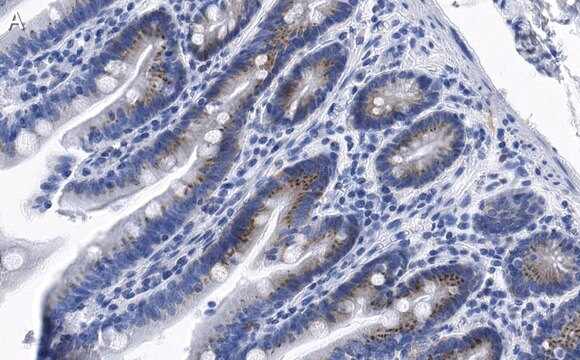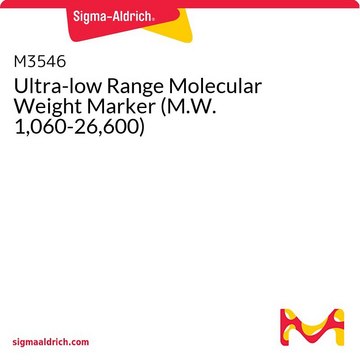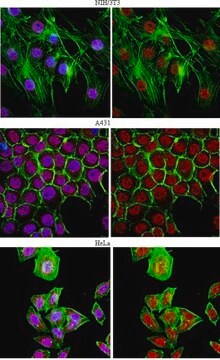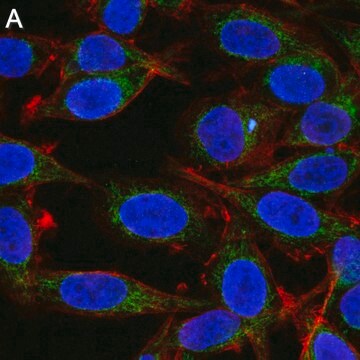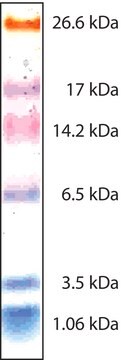ZRB2109
Anti-GRP75 Antibody, clone 2D20 ZooMAb® Rabbit Monoclonal

recombinant, expressed in HEK 293 cells
Synonim(y):
mitochondrialne białko Stress-70; białko regulowane glukozą 75 kDa; GRP-75; białko szoku cieplnego 70 kDa 9; Mortalina; MOT; białko wiążące peptydy 74; PBP74
About This Item
Polecane produkty
pochodzenie biologiczne
rabbit
Poziom jakości
rekombinowane
expressed in HEK 293 cells
białko sprzężone
unconjugated
forma przeciwciała
purified antibody
rodzaj przeciwciała
primary antibodies
klon
2D20, recombinant monoclonal
opis
2D20 Clone
linia produktu
ZooMAb® learn more
Formularz
lyophilized
masa cząsteczkowa
calculated mol wt 73.68 kDa
observed mol wt ~70 kDa
oczyszczone przez
using Protein A
reaktywność gatunkowa
rat, mouse, monkey, human
reaktywność gatunkowa (przewidywana na podstawie homologii)
feline, canine, bovine, porcine
opakowanie
antibody small pack of 25 μL
charakterystyka ekologicznej alternatywy
Waste Prevention
Designing Safer Chemicals
Design for Energy Efficiency
Learn more about the Principles of Green Chemistry.
rozszerzona walidacja
recombinant expression
Learn more about Antibody Enhanced Validation
sustainability
Greener Alternative Product
metody
affinity binding assay: suitable
immunocytochemistry: suitable
immunohistochemistry: suitable
western blot: suitable
izotyp
IgG
sekwencja epitopowa
N-terminal half
numer dostępu Protein ID
numer dostępu UniProt
kategoria ekologicznej alternatywy
, Aligned
Warunki transportu
ambient
temp. przechowywania
2-8°C
docelowa modyfikacja potranslacyjna
unmodified
informacje o genach
human ... HSPA9(3313)
Opis ogólny
Specyficzność
Immunogen
Zastosowanie
Oceniane metodą Western Blotting w lizacie komórek PC12.
Analiza Western Blotting: Rozcieńczenie 1:1000 tego przeciwciała wykryło GRP75 w lizacie komórek PC12.
Testowane aplikacje
Analiza Western Blotting: Rozcieńczenie 1:1000 z reprezentatywnej partii wykryło GRP75 w lizatach komórek COS-7, MCF-7 i NIH3T3.
Analiza immunohistochemiczna (parafina): Rozcieńczenie 1:100 z reprezentatywnej partii wykryło GRP75 w wycinkach tkanki ludzkiej nerki.
Analiza immunocytochemiczna: Rozcieńczenie 1:100 z reprezentatywnej partii wykryło GRP75 w komórkach MCF-7.
Affinity Binding Assay: Reprezentatywna partia tego przeciwciała związała peptyd GRP75 z KD wynoszącym 2,3 x 10-7 w teście wiązania powinowactwa.
Uwaga: Rzeczywiste optymalne rozcieńczenia robocze muszą być określone przez użytkownika końcowego jako próbki, a warunki eksperymentalne mogą się różnić w zależności od użytkownika końcowego.
Opis wartości docelowych
Postać fizyczna
Przechowywanie i stabilność
Informacje prawne
Oświadczenie o zrzeczeniu się odpowiedzialności
Nie możesz znaleźć właściwego produktu?
Wypróbuj nasz Narzędzie selektora produktów.
Kod klasy składowania
11 - Combustible Solids
Klasa zagrożenia wodnego (WGK)
WGK 1
Temperatura zapłonu (°F)
Not applicable
Temperatura zapłonu (°C)
Not applicable
Wybierz jedną z najnowszych wersji:
Certyfikaty analizy (CoA)
It looks like we've run into a problem, but you can still download Certificates of Analysis from our Dokumenty section.
Proszę o kontakt, jeśli potrzebna jest pomoc Obsługa Klienta
Masz już ten produkt?
Dokumenty związane z niedawno zakupionymi produktami zostały zamieszczone w Bibliotece dokumentów.
Nasz zespół naukowców ma doświadczenie we wszystkich obszarach badań, w tym w naukach przyrodniczych, materiałoznawstwie, syntezie chemicznej, chromatografii, analityce i wielu innych dziedzinach.
Skontaktuj się z zespołem ds. pomocy technicznej